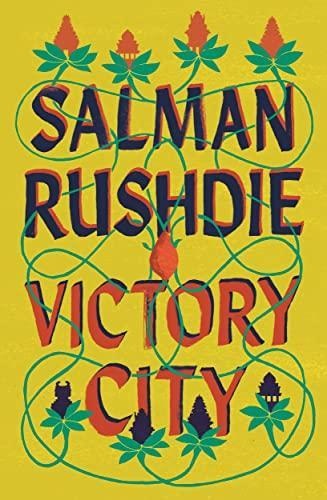
- Victory city, Salman Rushdie
- London : Jonathan Cape, 2023
- 342 pages
- ISBN: 978-1-78733-345-1
Victory City, the first book by Salman Rushdie published after the savage attack in which the writer lost his eye, follows the theme already explored in Children of Midnight and The Satanic Verses: fundamentalism and its attempts to eliminate any kind of pluralism in the societies.
The novel is presented as a sacred text, similar to, for example, the Mahabharata, which describes the story of the creation of Bisnaga, Victory City, the beginning and fall of a great empire. Bisnaga is founded thanks to Pampa Kampana, blessed with magic and a very long life (247 years) by the goddess Parvati. Through her eyes in a simplified and annotated transcription of his epic poem Victory and Defeat we see the subsequent dynasties that rule Bisnaga and how their views, goals and influences change.
The book is written almost like a fairy tale with many magical elements, but also mixing into the narrative many facts that we knew from real history. It’s very rewarding to fish out these parts and compare them with what is completely invented. But behind this pleasant narrative lies a much bigger message, since the story about a kingdom that is based on pluralism but does not live up to its ideals can be translated to the political situation of many countries today. It is even more disturbing to know that the attack on Rushdie took place at a literary event in New York just a few days after announcing the theme of this book.
It’s undoubtedly an interesting read that can be enjoyed on many levels and that poses many dilemmas. For those of you who want to join Donostia Book Club’s first gathering of the season on September, 11th or simply want to reflect on the novel, we leave you some interesting questions proposed by the Spanish publisher Random House:
- Victory City marks Rushdie’s return to Hindu history, culture and scenes.
If you’re familiar with his work, what does this imply literary in comparison to his Western-style novels? - How does the novel approach the theme of motherhood?
- From the very beginning, the novel is clearly positioned within a message of female empowerment. What elements —characters, facts…— are reinforcing this objective throughout history?
- What parallels do you find between Pampa Kampana and the figure of the novelist?
- For what reasons would you say that the author opted for the formula of an epic poem rewritten for the benefit of today’s reader? What allows you to achieve that with a simple reproduction of the original you would not be able to?
- Discuss the meaning of the phrase that closes the book: «Words are the only winners».
- What stories from other religious and mythical sources, from the Bible to Nordic sagas, for example, does the novel remind you at times?

